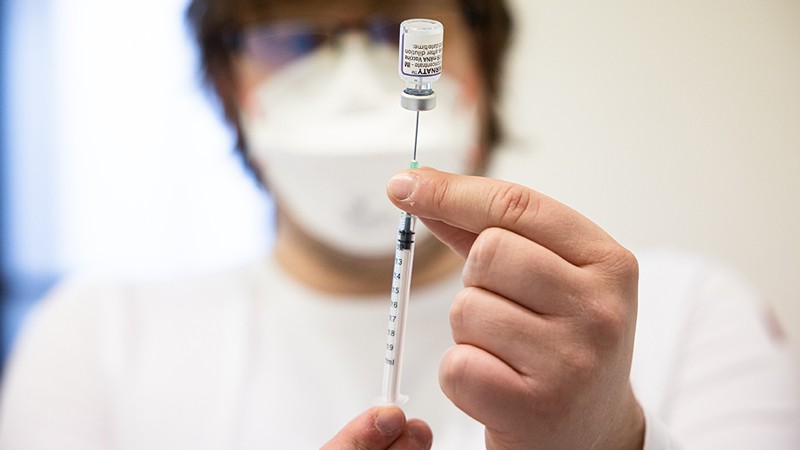Long-COVID symptoms less likely in vaccinated people, Israeli data say
Data from people infected with SARS-CoV-2 early in the pandemic add to growing evidence suggesting that vaccination can help to reduce the risk of long COVID (P. Kuodi et al. Preprint at medRxiv https://doi.org/hd29; 2022).
Scientists in Israel report that people who have both been infected with SARS-CoV-2 and received doses of the Pfizer–BioNTech vaccine are much less likely to report any of a range of common long-COVID symptoms than are people who were unvaccinated when infected. In fact, vaccinated people are no more likely to report symptoms than people who have never caught SARS-CoV-2. The study has not yet been peer reviewed.
“Here is another reason to get vaccinated, if you needed one,” says co-author Michael Edelstein, an epidemiologist at Bar-Ilan University in Safed, Israel.
People with long COVID have symptoms, such as fatigue, long after SARS-CoV-2 infection.
In theory, vaccination could protect against the condition by shortening the virus’s free rein in the body during breakthrough infections. But the few studies examining whether vaccines protect against long COVID have had mixed results, says Akiko Iwasaki, a viral immunologist at the Yale School of Medicine in New Haven, Connecticut.
To learn more, between July and November 2021, Edelstein and his co-authors asked some 3,000 people whether they were experiencing the most common long COVID symptoms. All had been tested for SARS-CoV-2 between March 2020 and the study period.
The researchers compared the prevalence of each symptom with self-reported vaccination status and found that fully vaccinated participants who had also had COVID-19 were 54% less likely to report headaches, 64% less likely to report fatigue and 68% less likely to report muscle pain than were their unvaccinated counterparts. Edelstein says his team’s results echo those of other research, including a UK-based study (M. Antonelli et al. Lancet Infect. Dis. 22, 43–55; 2022) from last September that found that vaccination halved the risk of long COVID.
Claire Steves, a geriatrician at King’s College London who led the UK study, agrees that the Israeli data support earlier findings. “It’s really good to see different study designs correlating, with the same results,” she says.
High costs of open-access publishing deter authors
The fees that journals charge to publish researchers’ work open access are a barrier for authors in low- and middle-income countries, an analysis finds.
More academic journals have been making their articles free to read, driven in part by open-access requirements from research funders. Although this has made more of the scholarly literature accessible, many scientists have noted the high article-processing charges (APCs) required to publish open-access papers in some titles.
Researchers examined more than 37,000 articles published by Elsevier in 38 ‘hybrid’ journals, which contain both paywalled and freely accessible articles, and their ‘mirror’ titles — fully open-access versions of those journals (A. C. Smith et al. Quant. Sci. Stud. https://doi.org/gn38g5; 2021). The APCs for the mirror journals cost a median of US$2,600. Around 80% of articles in mirror journals had lead authors from high-income countries, and none had authors from low-income countries.
“When we see results like this, it just makes it crystal clear that there is a very strong financial barrier for publishing when journals charge APCs,” says Rafael Zenni, an ecologist at the Federal University of Lavras in Brazil.
Publishing ban for tobacco-funded researchers
A group of international respiratory societies has banned researchers associated with tobacco companies from publishing papers in their journals, after the controversial acquisition by a tobacco giant of a health-care firm that makes inhalers.
Last year, the Swiss-American tobacco company Philip Morris International, which owns some of the world’s popular cigarette brands, took over UK-based pharmaceutical firm Vectura. In response, six health bodies, including the American Thoracic Society, the European Respiratory Society and the International Union Against Tuberculosis and Lung Diseases, have issued a joint statement describing the move as “highly unethical and inappropriate”.
Respiratory societies have banned researchers directly funded by tobacco companies for more than a decade. Now, the organizations have extended that ban to researchers working for firms acquired by tobacco companies.
The statement says that employees of such companies will not be allowed to publish in the societies’ journals or present at meetings, and recommends that people do not use medical products newly developed by tobacco-owned firms.









More News
Author Correction: Stepwise activation of a metabotropic glutamate receptor – Nature
Changing rainforest to plantations shifts tropical food webs
Streamlined skull helps foxes take a nosedive